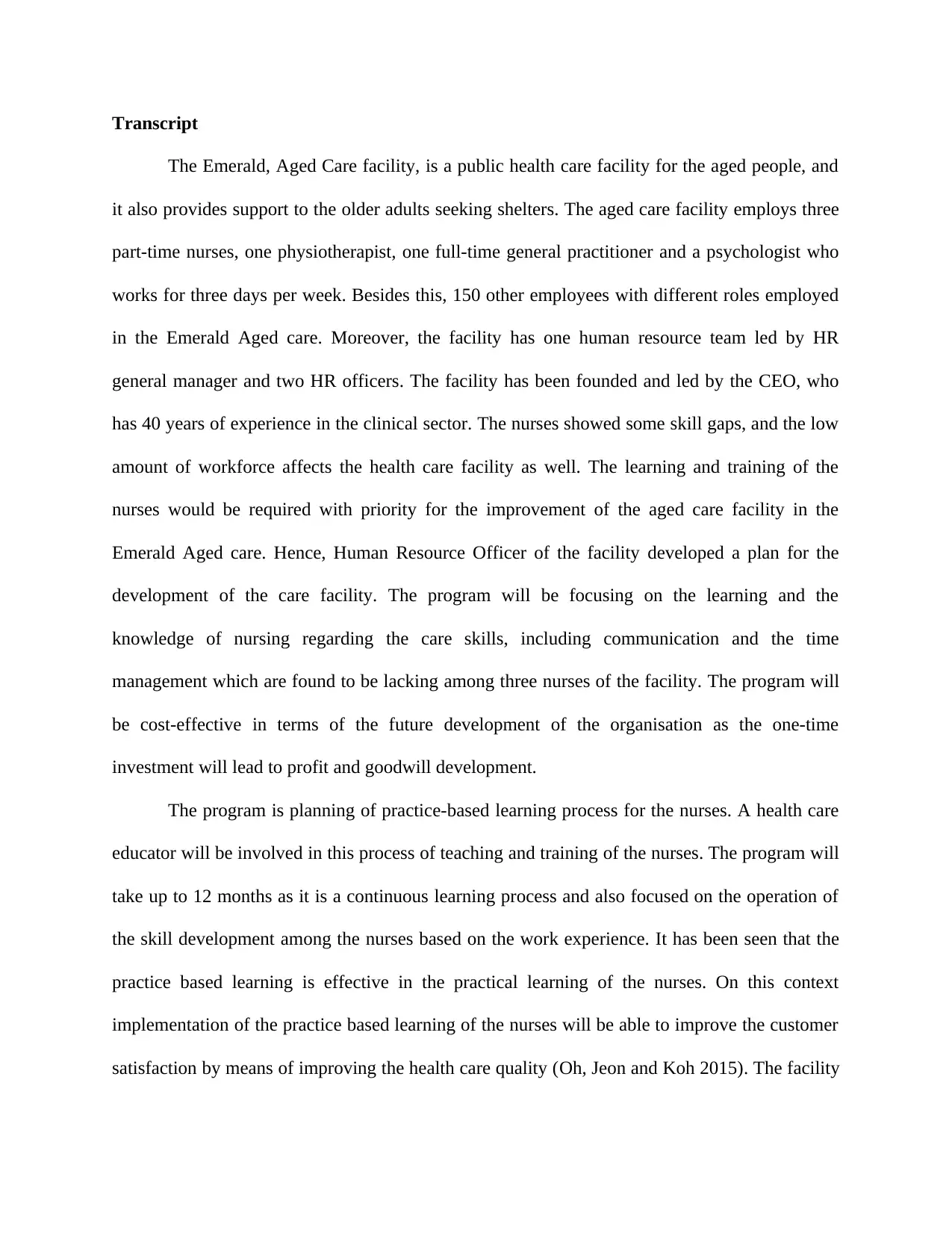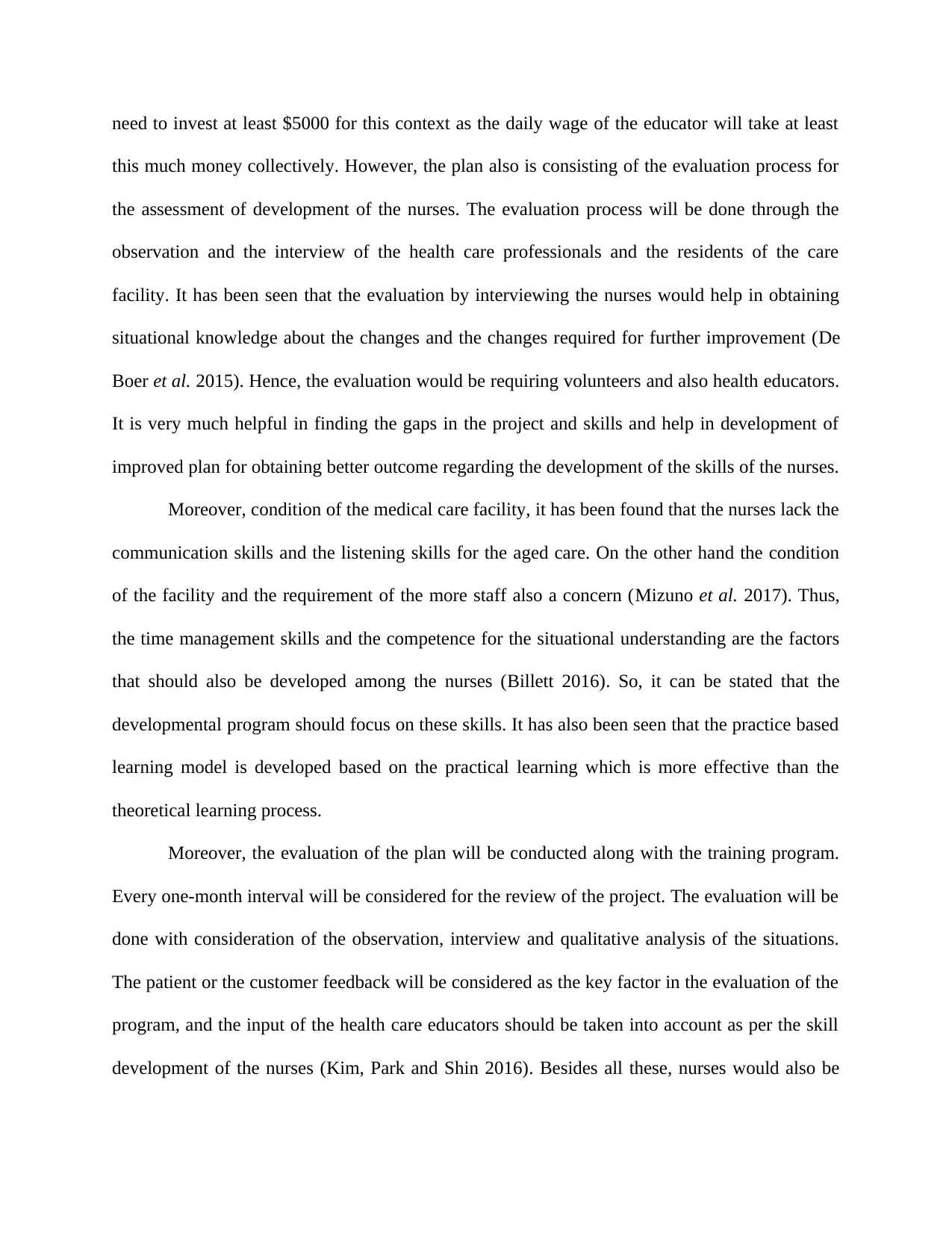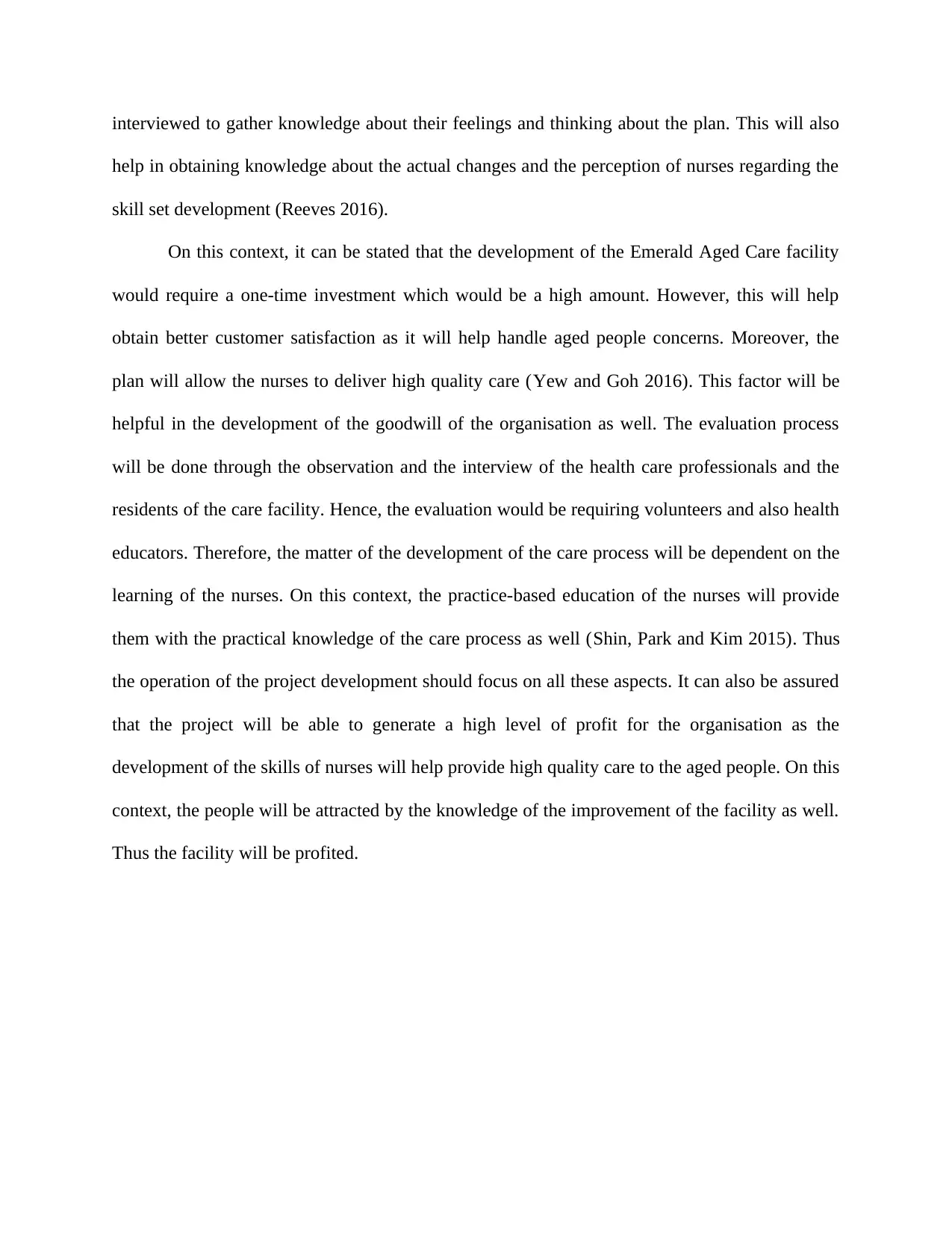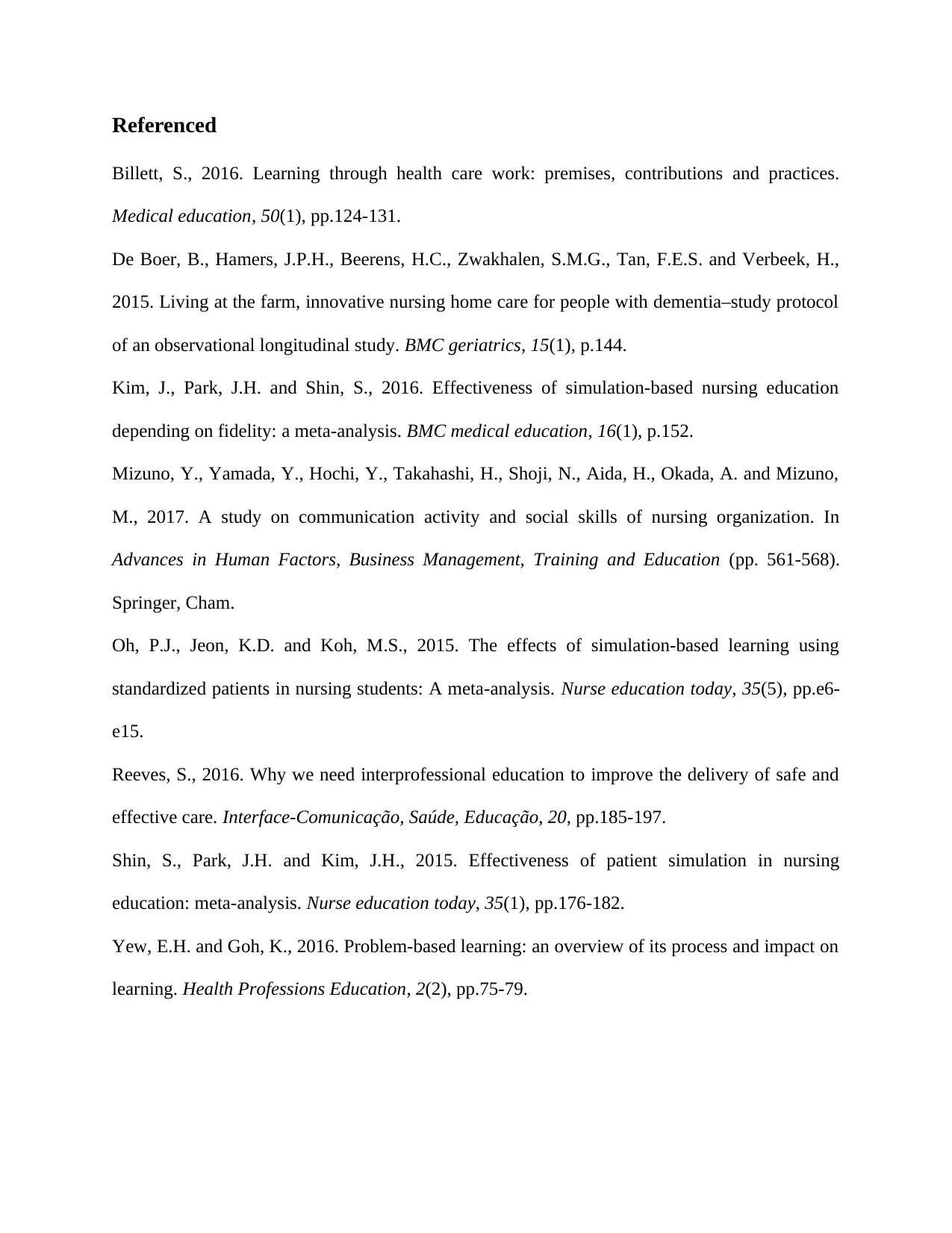HRD Proposal: Skill Development Plan for Emerald Aged Care Facility
VerifiedAdded on 2022/10/14
|4
|1387
|10
Project
AI Summary
The provided document is a learning and development proposal designed for the Emerald Aged Care facility, a public healthcare facility for the aged. It addresses the identified skill gaps among the nursing staff, particularly in communication and time management, proposing a practice-based learning program led by a healthcare educator. The program, estimated to cost $5000 and spanning 12 months, includes evaluations through observations, interviews, and patient feedback to assess the nurses' development and the program's effectiveness. The proposal emphasizes the importance of improved skills for enhancing customer satisfaction, delivering high-quality care, and developing goodwill for the organization. The plan also focuses on the development of the staff and the quality of medical care provided to the patients by focusing on the communication and time management skills.

Transcript
The Emerald, Aged Care facility, is a public health care facility for the aged people, and
it also provides support to the older adults seeking shelters. The aged care facility employs three
part-time nurses, one physiotherapist, one full-time general practitioner and a psychologist who
works for three days per week. Besides this, 150 other employees with different roles employed
in the Emerald Aged care. Moreover, the facility has one human resource team led by HR
general manager and two HR officers. The facility has been founded and led by the CEO, who
has 40 years of experience in the clinical sector. The nurses showed some skill gaps, and the low
amount of workforce affects the health care facility as well. The learning and training of the
nurses would be required with priority for the improvement of the aged care facility in the
Emerald Aged care. Hence, Human Resource Officer of the facility developed a plan for the
development of the care facility. The program will be focusing on the learning and the
knowledge of nursing regarding the care skills, including communication and the time
management which are found to be lacking among three nurses of the facility. The program will
be cost-effective in terms of the future development of the organisation as the one-time
investment will lead to profit and goodwill development.
The program is planning of practice-based learning process for the nurses. A health care
educator will be involved in this process of teaching and training of the nurses. The program will
take up to 12 months as it is a continuous learning process and also focused on the operation of
the skill development among the nurses based on the work experience. It has been seen that the
practice based learning is effective in the practical learning of the nurses. On this context
implementation of the practice based learning of the nurses will be able to improve the customer
satisfaction by means of improving the health care quality (Oh, Jeon and Koh 2015). The facility
The Emerald, Aged Care facility, is a public health care facility for the aged people, and
it also provides support to the older adults seeking shelters. The aged care facility employs three
part-time nurses, one physiotherapist, one full-time general practitioner and a psychologist who
works for three days per week. Besides this, 150 other employees with different roles employed
in the Emerald Aged care. Moreover, the facility has one human resource team led by HR
general manager and two HR officers. The facility has been founded and led by the CEO, who
has 40 years of experience in the clinical sector. The nurses showed some skill gaps, and the low
amount of workforce affects the health care facility as well. The learning and training of the
nurses would be required with priority for the improvement of the aged care facility in the
Emerald Aged care. Hence, Human Resource Officer of the facility developed a plan for the
development of the care facility. The program will be focusing on the learning and the
knowledge of nursing regarding the care skills, including communication and the time
management which are found to be lacking among three nurses of the facility. The program will
be cost-effective in terms of the future development of the organisation as the one-time
investment will lead to profit and goodwill development.
The program is planning of practice-based learning process for the nurses. A health care
educator will be involved in this process of teaching and training of the nurses. The program will
take up to 12 months as it is a continuous learning process and also focused on the operation of
the skill development among the nurses based on the work experience. It has been seen that the
practice based learning is effective in the practical learning of the nurses. On this context
implementation of the practice based learning of the nurses will be able to improve the customer
satisfaction by means of improving the health care quality (Oh, Jeon and Koh 2015). The facility
Paraphrase This Document
Need a fresh take? Get an instant paraphrase of this document with our AI Paraphraser

need to invest at least $5000 for this context as the daily wage of the educator will take at least
this much money collectively. However, the plan also is consisting of the evaluation process for
the assessment of development of the nurses. The evaluation process will be done through the
observation and the interview of the health care professionals and the residents of the care
facility. It has been seen that the evaluation by interviewing the nurses would help in obtaining
situational knowledge about the changes and the changes required for further improvement (De
Boer et al. 2015). Hence, the evaluation would be requiring volunteers and also health educators.
It is very much helpful in finding the gaps in the project and skills and help in development of
improved plan for obtaining better outcome regarding the development of the skills of the nurses.
Moreover, condition of the medical care facility, it has been found that the nurses lack the
communication skills and the listening skills for the aged care. On the other hand the condition
of the facility and the requirement of the more staff also a concern (Mizuno et al. 2017). Thus,
the time management skills and the competence for the situational understanding are the factors
that should also be developed among the nurses (Billett 2016). So, it can be stated that the
developmental program should focus on these skills. It has also been seen that the practice based
learning model is developed based on the practical learning which is more effective than the
theoretical learning process.
Moreover, the evaluation of the plan will be conducted along with the training program.
Every one-month interval will be considered for the review of the project. The evaluation will be
done with consideration of the observation, interview and qualitative analysis of the situations.
The patient or the customer feedback will be considered as the key factor in the evaluation of the
program, and the input of the health care educators should be taken into account as per the skill
development of the nurses (Kim, Park and Shin 2016). Besides all these, nurses would also be
this much money collectively. However, the plan also is consisting of the evaluation process for
the assessment of development of the nurses. The evaluation process will be done through the
observation and the interview of the health care professionals and the residents of the care
facility. It has been seen that the evaluation by interviewing the nurses would help in obtaining
situational knowledge about the changes and the changes required for further improvement (De
Boer et al. 2015). Hence, the evaluation would be requiring volunteers and also health educators.
It is very much helpful in finding the gaps in the project and skills and help in development of
improved plan for obtaining better outcome regarding the development of the skills of the nurses.
Moreover, condition of the medical care facility, it has been found that the nurses lack the
communication skills and the listening skills for the aged care. On the other hand the condition
of the facility and the requirement of the more staff also a concern (Mizuno et al. 2017). Thus,
the time management skills and the competence for the situational understanding are the factors
that should also be developed among the nurses (Billett 2016). So, it can be stated that the
developmental program should focus on these skills. It has also been seen that the practice based
learning model is developed based on the practical learning which is more effective than the
theoretical learning process.
Moreover, the evaluation of the plan will be conducted along with the training program.
Every one-month interval will be considered for the review of the project. The evaluation will be
done with consideration of the observation, interview and qualitative analysis of the situations.
The patient or the customer feedback will be considered as the key factor in the evaluation of the
program, and the input of the health care educators should be taken into account as per the skill
development of the nurses (Kim, Park and Shin 2016). Besides all these, nurses would also be

interviewed to gather knowledge about their feelings and thinking about the plan. This will also
help in obtaining knowledge about the actual changes and the perception of nurses regarding the
skill set development (Reeves 2016).
On this context, it can be stated that the development of the Emerald Aged Care facility
would require a one-time investment which would be a high amount. However, this will help
obtain better customer satisfaction as it will help handle aged people concerns. Moreover, the
plan will allow the nurses to deliver high quality care (Yew and Goh 2016). This factor will be
helpful in the development of the goodwill of the organisation as well. The evaluation process
will be done through the observation and the interview of the health care professionals and the
residents of the care facility. Hence, the evaluation would be requiring volunteers and also health
educators. Therefore, the matter of the development of the care process will be dependent on the
learning of the nurses. On this context, the practice-based education of the nurses will provide
them with the practical knowledge of the care process as well (Shin, Park and Kim 2015). Thus
the operation of the project development should focus on all these aspects. It can also be assured
that the project will be able to generate a high level of profit for the organisation as the
development of the skills of nurses will help provide high quality care to the aged people. On this
context, the people will be attracted by the knowledge of the improvement of the facility as well.
Thus the facility will be profited.
help in obtaining knowledge about the actual changes and the perception of nurses regarding the
skill set development (Reeves 2016).
On this context, it can be stated that the development of the Emerald Aged Care facility
would require a one-time investment which would be a high amount. However, this will help
obtain better customer satisfaction as it will help handle aged people concerns. Moreover, the
plan will allow the nurses to deliver high quality care (Yew and Goh 2016). This factor will be
helpful in the development of the goodwill of the organisation as well. The evaluation process
will be done through the observation and the interview of the health care professionals and the
residents of the care facility. Hence, the evaluation would be requiring volunteers and also health
educators. Therefore, the matter of the development of the care process will be dependent on the
learning of the nurses. On this context, the practice-based education of the nurses will provide
them with the practical knowledge of the care process as well (Shin, Park and Kim 2015). Thus
the operation of the project development should focus on all these aspects. It can also be assured
that the project will be able to generate a high level of profit for the organisation as the
development of the skills of nurses will help provide high quality care to the aged people. On this
context, the people will be attracted by the knowledge of the improvement of the facility as well.
Thus the facility will be profited.
⊘ This is a preview!⊘
Do you want full access?
Subscribe today to unlock all pages.

Trusted by 1+ million students worldwide

Referenced
Billett, S., 2016. Learning through health care work: premises, contributions and practices.
Medical education, 50(1), pp.124-131.
De Boer, B., Hamers, J.P.H., Beerens, H.C., Zwakhalen, S.M.G., Tan, F.E.S. and Verbeek, H.,
2015. Living at the farm, innovative nursing home care for people with dementia–study protocol
of an observational longitudinal study. BMC geriatrics, 15(1), p.144.
Kim, J., Park, J.H. and Shin, S., 2016. Effectiveness of simulation-based nursing education
depending on fidelity: a meta-analysis. BMC medical education, 16(1), p.152.
Mizuno, Y., Yamada, Y., Hochi, Y., Takahashi, H., Shoji, N., Aida, H., Okada, A. and Mizuno,
M., 2017. A study on communication activity and social skills of nursing organization. In
Advances in Human Factors, Business Management, Training and Education (pp. 561-568).
Springer, Cham.
Oh, P.J., Jeon, K.D. and Koh, M.S., 2015. The effects of simulation-based learning using
standardized patients in nursing students: A meta-analysis. Nurse education today, 35(5), pp.e6-
e15.
Reeves, S., 2016. Why we need interprofessional education to improve the delivery of safe and
effective care. Interface-Comunicação, Saúde, Educação, 20, pp.185-197.
Shin, S., Park, J.H. and Kim, J.H., 2015. Effectiveness of patient simulation in nursing
education: meta-analysis. Nurse education today, 35(1), pp.176-182.
Yew, E.H. and Goh, K., 2016. Problem-based learning: an overview of its process and impact on
learning. Health Professions Education, 2(2), pp.75-79.
Billett, S., 2016. Learning through health care work: premises, contributions and practices.
Medical education, 50(1), pp.124-131.
De Boer, B., Hamers, J.P.H., Beerens, H.C., Zwakhalen, S.M.G., Tan, F.E.S. and Verbeek, H.,
2015. Living at the farm, innovative nursing home care for people with dementia–study protocol
of an observational longitudinal study. BMC geriatrics, 15(1), p.144.
Kim, J., Park, J.H. and Shin, S., 2016. Effectiveness of simulation-based nursing education
depending on fidelity: a meta-analysis. BMC medical education, 16(1), p.152.
Mizuno, Y., Yamada, Y., Hochi, Y., Takahashi, H., Shoji, N., Aida, H., Okada, A. and Mizuno,
M., 2017. A study on communication activity and social skills of nursing organization. In
Advances in Human Factors, Business Management, Training and Education (pp. 561-568).
Springer, Cham.
Oh, P.J., Jeon, K.D. and Koh, M.S., 2015. The effects of simulation-based learning using
standardized patients in nursing students: A meta-analysis. Nurse education today, 35(5), pp.e6-
e15.
Reeves, S., 2016. Why we need interprofessional education to improve the delivery of safe and
effective care. Interface-Comunicação, Saúde, Educação, 20, pp.185-197.
Shin, S., Park, J.H. and Kim, J.H., 2015. Effectiveness of patient simulation in nursing
education: meta-analysis. Nurse education today, 35(1), pp.176-182.
Yew, E.H. and Goh, K., 2016. Problem-based learning: an overview of its process and impact on
learning. Health Professions Education, 2(2), pp.75-79.
1 out of 4
Related Documents
Your All-in-One AI-Powered Toolkit for Academic Success.
+13062052269
info@desklib.com
Available 24*7 on WhatsApp / Email
![[object Object]](/_next/static/media/star-bottom.7253800d.svg)
Unlock your academic potential
Copyright © 2020–2026 A2Z Services. All Rights Reserved. Developed and managed by ZUCOL.





